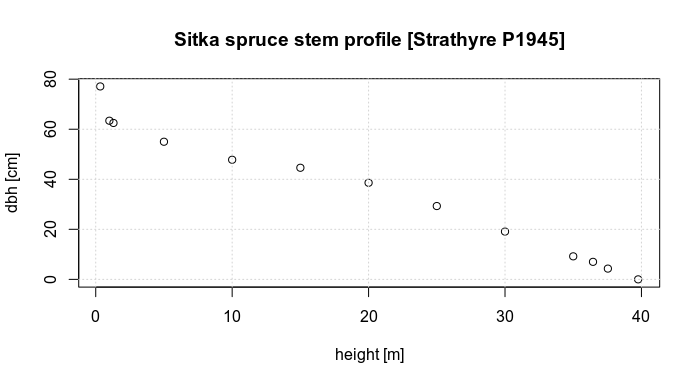Disclaimer: The documents, data and/or models produced here are for interest only and not subjected to formal validation or review. The aim is to explore open data and test its potential in forestry studies. Use at your own risk.
The volume of woody biomass in a tree stem can be estimated as a function of height, diameter and a form factor. The aim of this study is to test whether a form factor of 0.4 (a common default value) accurately represents the volume of a mature Picea sitchensis (Sitka spruce).
As part of a planned survey of a partially felled P1945 Sitka spruce in 2017 near the village of Strathyre in Scotland it was found that several remaining edge trees had been windblown. There was sufficient time to record diameters along the stem of one tree to estimate the volume. The whole tree length was measured, diameters recorded every 5m along the stem. Additionally measurements were recorded at 0.3m (stump height), 1.3m (dbh) and the height at which diameter was 7cm (the smallest marketable diameter class).
The volume was estimated using four methods:
The stem taper profile is shown in figure 1 and the measurements are listed in table 1. The performance of various estimation methods of volume are listed in table 2.

Figure 1: Stem taper profile for a fallen Sitka spruce at Strathyre West.
Table 1: Height and diameter measurements along the stem. * width of leader = 1.4cm
| Height (m) | Diameter (cm) |
| 0.33 | 77.1 |
| 1.00 | 63.4 |
| 1.30 | 62.5 |
| 5.00 | 55.0 |
| 10.00 | 47.8 |
| 15.00 | 44.6 |
| 20.00 | 38.6 |
| 25.00 | 29.3 |
| 30.00 | 19.1 |
| 35.00 | 9.2 |
| 36.45 | 7.0 |
| 37.54 | 4.3 |
| 39.76 | 0* |
Table 2: Volume estimates from four methods applied to the data in table 1.
| Model | Volume (m3) |
| Cone | 6.15 |
| Newton | 6.16 |
| 0.4 Form factor | 4.88 |
| 0.5 Form factor | 6.10 |
The cone and Newton methods produce near identical results with the data. The disadvantage of the Newton method in practice is that the stem would have to be measured above 1.3m which is often difficult with standing trees. A 0.5 form factor produced very similar results to the cone and Newton methods (within 1%), but the 0.4 form factor underestimated volume by 21%.
A form factor of 0.5 provides the best estimate of tree volume for a Sitka spruce stem 40m in length. More work is needed to test how form factor varies within populations and across across age/size classes.
Stem taper form factor Sitka spruce Picea sitchensis Scotland UK